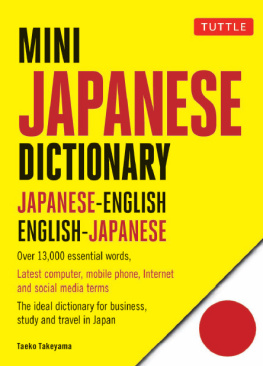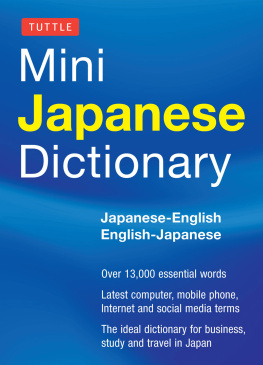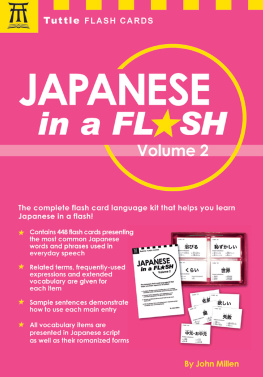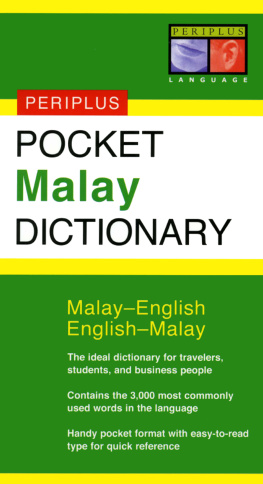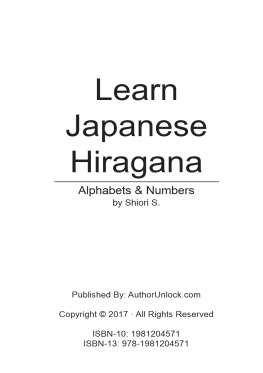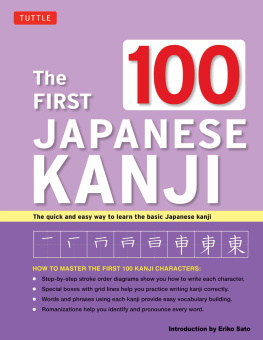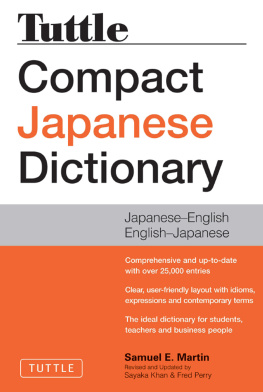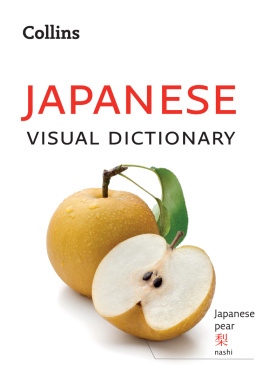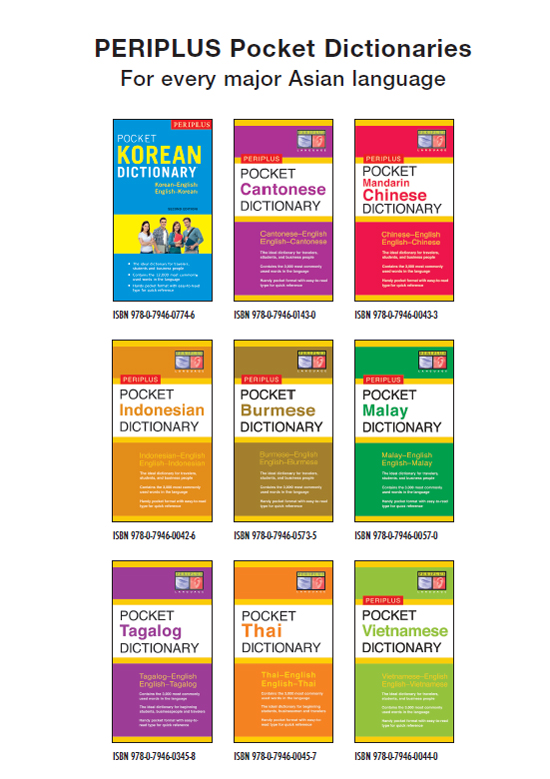
Contents
Published by Periplus Editions (HK) Ltd. www.periplus.com Copyright 2016 Periplus Editions (HK) Ltd. All rights reserved. No part of this publication may be reproduced or utilized in any form or by any means, electronic or mechanical, including photocopying, recording, or by any information storage and retrieval system, without prior written permission from the publisher. ISBN: 978-4-8053-1406-7; ISBN: 978-1-4629-1893-5 (ebook) Printed in China Distributed by: Japan
Tuttle Publishing
Yaekari Building, 3rd Floor, 5-4-12 Osaki
Shinagawa-ku, Tokyo 141 0032
Tel: (81) 3 5437-0171
Fax: (81) 3 5437-0755
sales@tuttle.co.jp
www.tuttle.co.jp North America, Latin America & Europe
Tuttle Publishing
364 Innovation Drive
North Clarendon, VT 05759-9436 U.S.A.
Tel: 1 (802) 773-8930
Fax: 1 (802) 773-6993
info@tuttlepublishing.com
www.tuttlepublishing.com Asia Pacific
Berkeley Books Pte Ltd
61 Tai Seng Avenue #02-12
Singapore 534167
Tel: (65) 6280 1330
Fax: (65) 6280 6290
inquiries@periplus.com.sg
www.periplus.com 20 19 18 17 16
6 5 4 3 2 1
1605RR
Introduction This Pocket Dictionary is an indispensable companion for visitors to Japan and for anyone in the early stages of learning Japanese. It contains all the 7,500 or so Japanese words that are most commonly encountered in colloquial, everyday speech.
For the sake of clarity, only the common Japanese equivalents for each English word have been given. When an English word has more than one possible meaning, with different Japanese equivalents, each meaning is listed separately, with a clear explanatory gloss. The layout is clear and accessible, with none of the abbreviations and dense nests of entries typical of many small dictionaries. The language of this dictionary is that spoken universally throughout the islands of Japan, by some 120 million people. Japanese is not clearly related to any other languages of the world. There was no written form of Japanese until the early centuries CE, when the system that had long been in use in China was borrowed and adapted.
Written Chinese does not relate directly to the sounds of the language; instead it makes use of a very large number of characters representing different syllables, to each of which is linked both a meaning and a sound. The characters derived initially from the stylized representation of concrete objects, to which the abstract meanings needed for the expression of the complete language were added by processes of combination and metaphor. The pronunciation of each of these characters is not obvious from the written form but must be learnt separately in each case. To make matters more complex, in Japanese each character (kanji) is usually associated with several possible pronunciations. One or more (the on readings) are derived from the Chinese syllable originally represented by the character, and others (the kun readings) from native Japanese elements of equivalent or associated meaning. Each reading is used in different contexts (for example when used alone or in compound words, as part of the general vocabulary or in proper names) and the choice is only partly predictable.
The Chinese language does not make use of inflections (changes to the form of a word to indicate grammatical information such as tense or number), so it can be effectively written in characters representing unvarying syllables. By contrast Japanese has many inflections, and the variable word endings and particles need to be represented in writing to prevent ambiguity. To this end a set of syllabic symbols (kana borrowed names), derived from Chinese characters but with only sound values and no meaning component, are used in conjunction with kanji. Thus in written Japanese the roots of words are represented by kanji, with the inflections and particles being in hiragana (rounded kana), derived from simplified cursive forms of certain kanji. Small versions of hiragana, known as furigana (applied kana), are also sometimes written above kanji to show their readings, for example in material for children or foreigners, or in case of ambiguity or some obscure characters used in personal names. A second version of the same set of syllables, with more angular forms and known as katakana (side kana, being derived from a part only of certain kanji) is also used for purposes such as transcribing foreign words and names, for representations of natural sounds, and sometimes for emphasis.
In this dictionary every Japanese word and phrase is also clearly spelled out in the Roman alphabet (romaji). In contrast with the complexity of the writing system, the pronunciation of Japanese is quite straightforward for English speakers: it is not a tonal language and syllables are evenly stressed. Distinguishing clearly between long and short vowels is important, as in several cases a completely different meaning can result. Long vowels are pronounced with twice the length of short vowels, effectively creating an extra syllable. In this dictionary they are indicated by a bar over the vowel concerned; elsewhere you may find them written with a double vowel, or with long e represented as ei and long o as ou , but these practices can be misleading to English speakers.
JapaneseEnglish A
abareru v to rage, to storm, to rampage abiru v to bathe oneself in; to douse, to shower abuku n bubble abunai adj dangerous abunai! excl ! Watch out! abura n fat abura n oil, grease abur(a)age n deep-fried bean curd aburakkoi adj oily, greasy, fatty aburu v to roast, to grill abutta adj roasted, grilled, toasted achikochi, achira kochira pron , here and there achira pron that one ( of two ) over there, the other one ( over there ); over there, that way, yonder achiragawa adv over there, the other side chisuto n artist adana n nickname adobaisu n advice adokenai adj innocent, childlike adoresuch n address book afureru v to overflow afut-sbisu n ( maintenance and repair ) service, servicing agaru v to go up, to rise; to feel self-conscious/nervous ageru v to raise up, to lift; to give ageru v to fry; ( a flag ) to raise; to fly a kite ageru v ( a wedding ceremony ) to hold ago n chin, jaw agohige n beard ahiru n duck ai n love aib n partner aida n interval, space, between; while aidagara n relationship aidea n idea aidoku suru v to like reading aijin n mistress aij n affection aikawarazu adv as usual/ever/always aikokushin n patriotic spirit, nationalism aikon n ( computer ) icon aiky n charm, attractiveness: aiky ga aru nice, attractive, charming aimai na adj ( word ) vague, muddled, fuzzy, unclear ainiku adv unfortunately airashii adj lovely, sweet airon n iron(ing) Airurando n Ireland Airurando(-jin) no adj () Irish aisatsu n greetings aish ga ii adj to be compatible with, to fit together well aiso/ais ga ii adj amiable, sociable, agreeable aisukh n iced coffee aisukurmu n ice cream aisuru v to love aisut n iced tea aite n the other fellow; companion; adversary, opponent ait (IT) n IT () ( computer ) information technology aitsu n that person aizu n signal, sign aji n taste; flavor: aji ga usui bland ajia n Asia ajike no nai, ajikenai adj , dreary, insipid, flavorless, flat ajimi o suru v ( salty , spicy ) to taste aji o shimeru v to get a taste of success ajiwau v to taste it aka n ( color ) red akachan n baby akai adj red akaku naru to turn red; to blush, to flush akari n light, lamp akarui adj bright, light; clear; cheerful, colorful akashingo n ( signal ) red light akemashite omedet Happy New Year! akeru v to open akeru v to leave empty, to vacate akeru v to open up, ( the day/year ) begins aki n autumn, ( season ) fall akichi n field, empty space akiraka ni suru v ( make known ) to reveal akirameru v to give up ( on ) akiru v ( get tired ) to weary of; to get enough of akogareru v to adore, to admire; to long for akubi suru v to yawn akuhy n ( unfavorable ) criticism akui n ill will, malice akujken n bad/unfavorable/adverse condition akuma n devil, Satan akunin n an evil person akusento n accent akusesar n an accessory akusesu suru v ( Internet ) to access akushitsu na adj malignant, pernicious, vicious akushon n action akush o hanatsu v to stink akushu n handshake akushumi n bad/poor taste amachua n an amateur amaeru v to presume on someones goodwill, to act like a baby amai adj sweet; permissive, lenient amari n remainder, surplus, over, more than; leftover amari adv [+ NEGATIVE verb] not very, not much, not many amari nai There are not so many.
Next page

